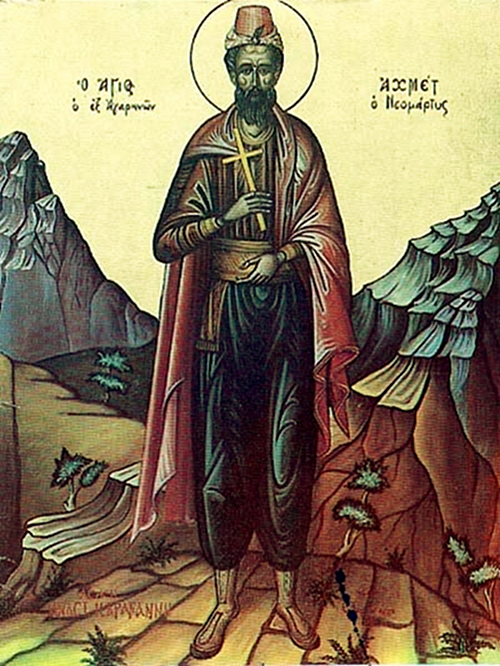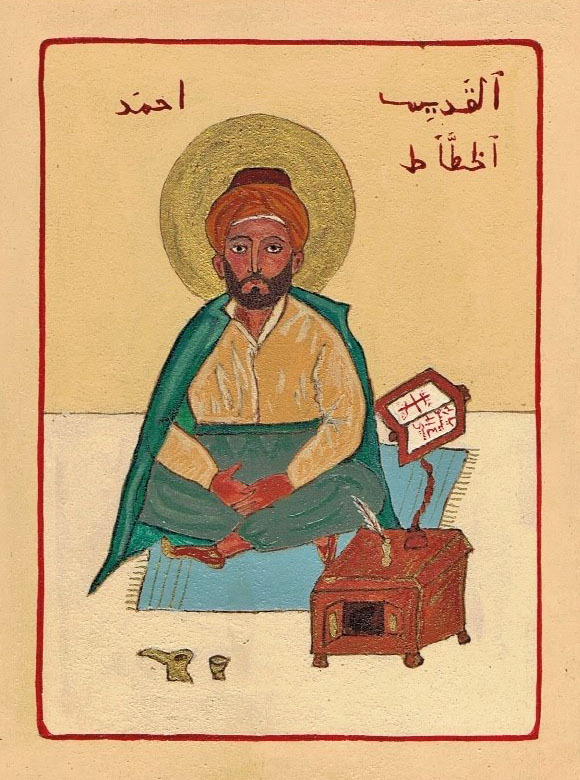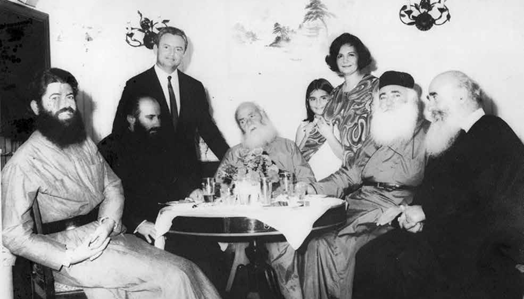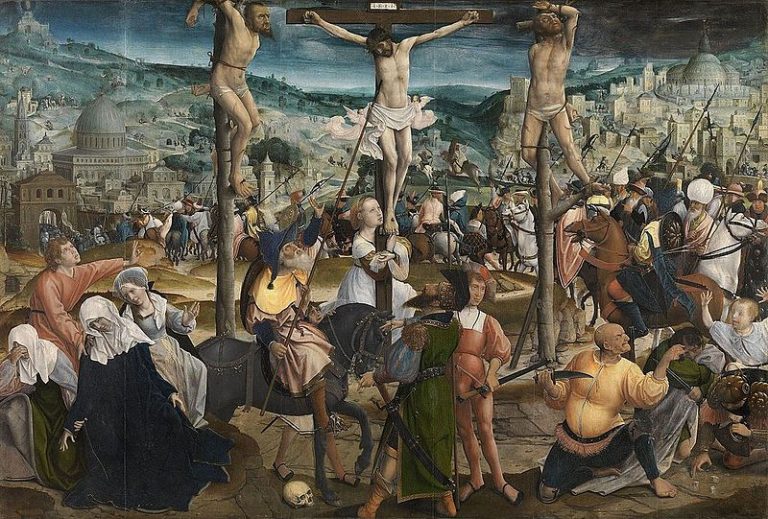Saint Ahmed: Mission to Muslims
Saint Ahmed or Ahmed lived at the end of the 17th century in Constantinople. In religion, as his name reveals, he was a Muslim. St. Nicodemus the Athonite in his new Martyrology informs us that he had a slave companion, Russian in descent and Christian in religion, who after each church service returned home, having been miraculously and yet perceptibly changed by the irreligious Ahmed. He says: “He, having a slave Russian, was in company with her, but he let her go to the Church of the Christians on the solemn days. And when she came out of the church, he smelled a fragrance incomprehensible coming out of her mouth, and he asked her what she ate and smelt eat?”[1]. She answered him that she eats hors d’oeuvres and drinks holy water. The bona fide and good lord Ahmed wanted to see with his own eyes to see, to experience, to feel what life in Christ means. He chose to attend the very core of Christian life, that service that made his companion smell good – the Divine Liturgy.
During the sacrament he observed the patriarch distributing a blessing in the form of a ray. It reached the heads of all the Christians except his own. Overwhelmed, he wished to be baptized a Christian, which he was. But he remained a crypto-Christian for a long time, until “in one assembly the magnates were disputing, who could be greater? And when they questioned him also, he cried out in answer, ‘The faith of the Christians is greater than all things. And he confessed himself a Christian, and preaching the whole mystery of the economy of Christ in the flesh with boldness, he received the blessed end of the martyrdom.”[2] 3 May 1683.
The memory of Saint Ahmed is commemorated on 24 December each year.

Mission to Muslims
Yes, mission to Muslims as well, since that is the Lord’s command: “make disciples of the Gentiles always” (Mt 28:19). The problem is not, dear brothers and sisters in Christ, to whom we will make a mission, who will accept it or to whom it will be fruitful, but who and in what spirit they will attempt to offer it. The best way of Orthodox witness is holiness, the imitation of Christ.
But let us see specifically what attitude the Lord took in his dealings with the Gentiles. He was amazed, praised, and appeased the centurion’s appeal for the healing of his servant; “and when Jesus heard it, he was astonished,” and calling the attention of those who would and would not be called “his own,” “he said to those who followed him, ‘Amen I say to you, there is no such faith in Israel as this.But I say unto you that many from the east and west shall rise and be raised up after Abraham and Isaac and Jacob in the kingdom of heaven, and the children of the kingdom shall be cast into outer darkness: there is the weeping and the roaring of the teeth” (Mt 8:10-12). Let us also study the wonderful missionary approach of St. Bright of Samaritan: “if you see the gift of God, and what it is that he says to you, give me a drink, if you have heard him, and he has given you living water” (Jn 4:10) and more: “But the hour cometh, and now is, when the true worshippers shall worship the Father in spirit and in truth: for the Father seeketh them that worship him. God’s spirit, and he shall see them that worship him in spirit and in truth” (Jn 4, 23-24).
It is also worth noting Peter’s vision of the universality of the apostolic work (Acts 10:1-33) and Philip’s exhortation from the Lord to approach Ethiopia (Acts 8:26-40).
Let us stop looking and expecting others, let us turn that critical gaze, which we have when we face the irreligious, to ourselves. Let us remember the controlling words Jesus addressed to Peter when he dealt with John by saying, “Lord, this man is not what?” The answer he got was: “if I will have him remain until I come, what of thee; thou followest me” (Jn 21:20).
Regarding the hostile attitude of Muslims towards other religions, and especially towards Christianity, I quote the words of a modern hierarch: “In the name of their hatred, we will not change our faith”, in which love, forgiveness and sacrifice play a decisive role.
Church history has preserved several efforts on the part of saints of our faith to reach out to the Mohammedans. We, in this particular article, will deal with only two – St. Cyril (one of the enlighteners of the Slavs) and St. Gregory Palamas[3].
We meet Constantine the Philosopher (later Saint Cyril) in 855 AD being sent by Emperor Michael III to the Arab Mohammedans in the city of Baghdad.[4] There the saint opened a dialogue and dealt with various issues such as the oppression of Christians, the Holy Trinity, the conscription of Christians, the taxes imposed on them and the achievements of the Arabs. We will only mention the first one. “When they (Constantine and his secretary arrived in Baghdad), they saw that on the outside of the door of the houses in which Christians were living, pictures of demons were painted, who were doing magic and grimacing. They then asked the Philosopher: “Philosopher, what do these drawings mean?”. And he said to them: “I see the faces of demons, and therefore I suppose that Christians dwell in the houses; that is, the demons cannot live with them, but go out and away from them. But where these designs are not outside the houses, the demons dwell with the people in the houses.” [5](The drawing of these demonic representations was obviously a measure of oppression and vilification of Christians by the Mohammedan authorities).

Furthermore, the interaction (necessarily) of Saint Gregory Palamas with the Mohammedans is also worthy of mention. But let us take things from the beginning. In 1354 the Saint was captured by the Turks and subjected to imprisonment, insults, torture and constant, difficult movements. More specifically, “their arrest must have taken place around 10 March 1354, and they were immediately taken to Lampsakos, and all of them were subjected to slavery, stripping and abuse “all over the body”. The prelate was particularly afflicted because of his precarious health and from the abuse he suffered “the paresis of the members (Gregory Palamas, To the Church 19)” [6]. However, the Saint was not discouraged but “had a sense of missionary work in Asia for the re-evangelization of the land and he also believed that it was a work of divine providence that he was taken captive there, where mixed Christians and Turkish Muslims lived, and was able to bring to all the message of the Lord Jesus Christ”.[7]. He was given the opportunity through the hardships of captivity to interact with the Chions, “a group of persons whose arrival remains mysterious. Two are the clues used by present-day scholars to solve the enigma of the Hions. Α) The supposed Muslim origin of their name; Arabic or Persian or Turkish, B) their heretical religious affiliation.[8].
Some admirable views of Saint Gregory in relation to Mohammedanism are the following… When asked why Christians do not believe in Muhammad and the Qur’an, the saint replied, “There is nothing in the Gospel that has not been prophesied and by the divine prophets; therefore, if there were written in it something about Muhammad, there would also be written in the prophets. But you will find it written and not deleted, that many false Christs and false prophets will come, and will deceive many.”[9]. And he continues, concerning Muhammad: ‘There is a custom with you and with us, attested by old time and law, not to admit anything as true without testimony. The testimonies are not twofold, or from the works and things themselves, or from trustworthy persons. So Moses bespattered Egypt with signs and monsters, split the sea with a rod and joined it again, rained down bread from heaven, but what need I say the rest, since Moses is trustworthy for you too? For he is also testified by God as a faithful servant, but not as a son nor as the Word. Then by divine command he went up into the mount and died and was added to his ancestors. But Christ, besides the many great miracles which he performed, is witnessed by Moses him and by the other prophets, and only in all ages he is said also by you also that he is the Word of God and only in all ages he was born without a man, of a virgin, and only in all ages he was taken up from Olivet to heaven and dwells there immortal, as you also confess. Therefore therefore we believe in Christ and his Gospel. But we do not find Muhammad to be witnessed either by the prophets, or to have accomplished anything wondrous and remarkable and leading to faith. Therefore we do not believe in him nor in the book that comes from him.” [10]. And I end with the following: “Muhammad, starting from the east, did of course arrive victorious until the setting of the sun, but he achieved this with war and sword, with plundering and plundering and manslaughter, none of which comes from the good God, but is rather an exemplary will of the homicidal maniac from the beginning. What, that is, and Alexander, starting from the west, did not subdue the whole east? But also many others many times with their campaigns expanded throughout the world. But no nation has entrusted its souls to any of them, as you have to Muhammad.” [11].
In conclusion, I note some suggestions for the communication we ought to have with those who approach this religion with a missionary purpose.
- For a thorough dialogue, not only with Muslims but also with any other religion or sect, the knowledge of both empirical and scientific orthodox theology is required on the part of the orthodox.
- A basic requirement is a good knowledge of the religion of Islam and its basic book, the Qur’an. In this case, the textbook of the archbishop of Albania Anastasios Yiannoulatos entitled “Islam” (religious overview) [12].
- In the missionary approach let us not hesitate to praise the good texts of this religion, as did St. Gregory Palamas, exclaiming to the Ottomans during the ceremony of their funeral: “that what is good for you is the ode performed outside of you”[13]– in translation: “I know that it was good what you did out there” and even “kudos”.
- But the aforementioned speech was wisely accompanied by “But the judge has the authority to grant pardon, and as judge, and according to your religion, of the whole race of men, Christ will come. Therefore it is to him that one must refer these prayers and blessings. Do you also call upon him as God, as we do, knowing that he is indivisible from the Father as his inherent Word?” [14]. So, like St. Gregory, we have the obligation to point out the errors of their faith and not in the name of a mere apparent love to abandon them to their error.
[1] http://www.diakonima.gr/2013/12/30/ (P.Vasileiou Kalliakmani)
[2] http://www.diakonima.gr/2013/12/30/ (P.Vasileiou Kalliakmani)
[3] Anastasiou Giannoulatou, Islam, “Akritas”, Athens 1975, p. 39.
[4] Ioannis Anastasiou, “On the life of Constantine”, , “Scientific Yearbook of the Theological School of the Aristotle University of Thessaloniki”, Thessaloniki 1967, p. 62.
Anastasios Giannoulatos, To the uttermost part of the earth, published by Apostolic Ministry, Tirana 2008, p. 132.
[5] Theodromia, Quarterly Publication of the Orthodox Diaspora, Issue 3, July-September 1999.
[6] Gregory Palamas, Works (Introduction, Panagiotis Christou), ed. “Gregorios Palamas”, H.P.E., Thessaloniki 1994, p. 59.
[7] Gregory Palamas, Works (Introduction, Panagiotis Christou), ed. “Gregorios Palamas”, H.P.E., Thessaloniki 1994, p. 57.
[8] Gregory Palamas, Works (Introduction, Panagiotis Christou), ed. “Gregorios Palamas”, H.P.E., Thessaloniki 1994, p. 63.
[9] Gregory Palamas, Works (Introduction, Panagiotis Christou), ed. “Gregorios Palamas”, H.P.E., Thessaloniki 1994, p. 186.
[10] Gregory Palamas, Works (Introduction, Panagiotis Christou), ed. “Gregorios Palamas”, H.P.E., Thessaloniki 1994, p. 205.
[11] Gregory Palamas, Works (Introduction, Panagiotis Christou), ed. “Gregorios Palamas”, H.P.E., Thessaloniki 1994, p. 191.
[12] Anastasiou Giannoulatou, Islam, “Akritas”, Athens 1975.
[13] Gregory Palamas, Works (Introduction, Panagiotis Christou), ed. “Gregorios Palamas”, H.P.E., Thessaloniki 1994, p. 203.
[14] Gregory Palamas, Works (Introduction, Panagiotis Christou), ed. “Gregorios Palamas”, H.P.E., Thessaloniki 1994, p. 203.





